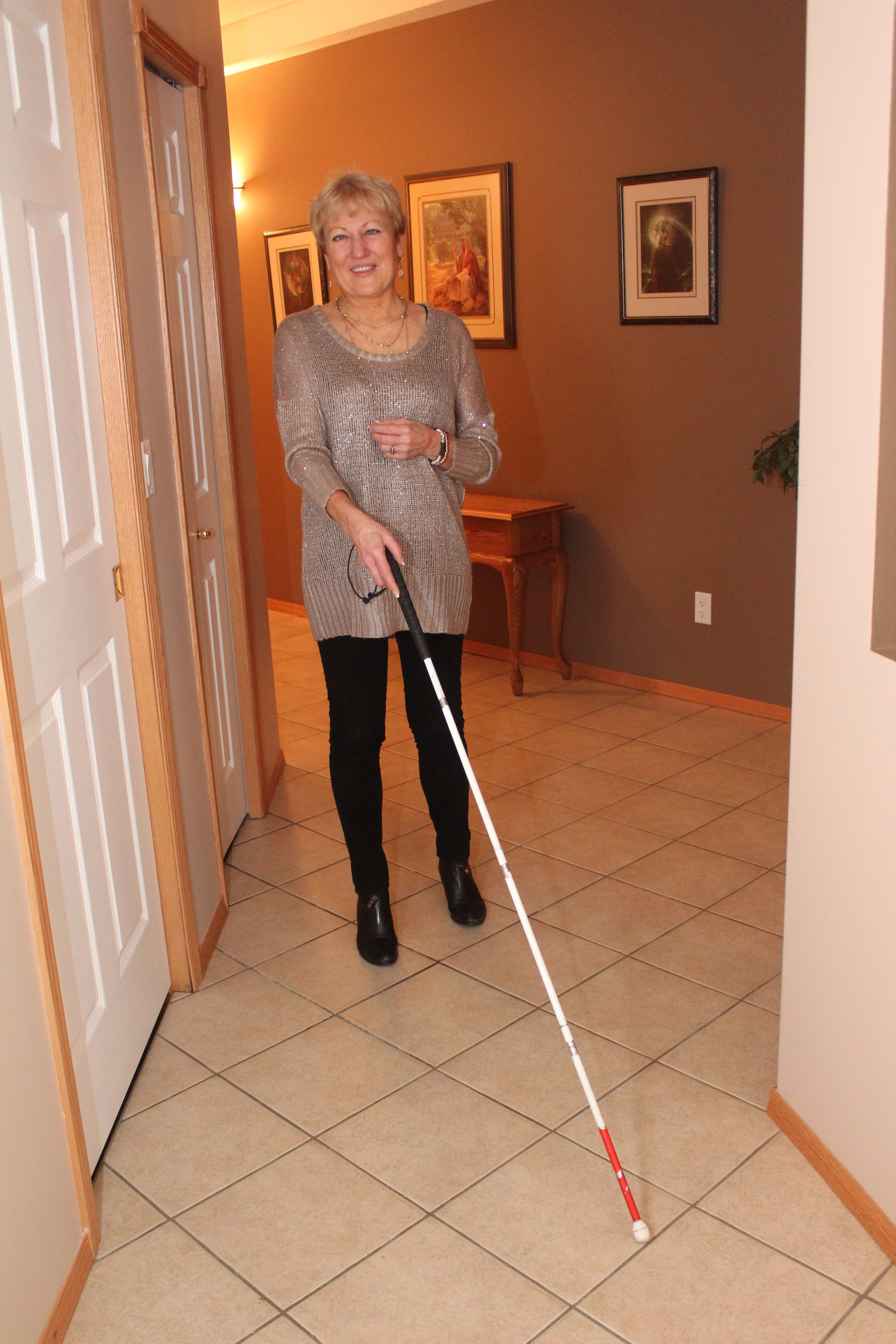Red Deerian Kim Skibsted’s parents knew there was something wrong with their daughter when Type 1 diabetic symptoms started surfacing when she was just three.
Excessive hunger, thirst and tiredness plagued the youngster. “Sure enough, that’s what it was.”
However for Skibsted, now 55, life seemed pretty normal through her youth and into adulthood in terms of family life, community involvement and her studies.
While working at the University Hospital in Edmonton, she noticed one day a profound change in her vision. This came about after several years of living on her own and she acknowledges she perhaps wasn’t as diligent in monitoring and correcting sugar levels as she could have been.
She was diagnosed with diabetic retinopathy – the most common cause of vision loss amongst Canadians under 50 years of age. Diabetic retinopathy is caused when elevated blood glucose levels cause vessels in the retina to swell and leak.
“Of course, back then the (insulin) was very different – you certainly got swings – highs and lows. It’s that change of blood sugars going too high and too low that causes the problems with the blood vessels.”
Currently, 43,000 Albertans are living with some form of this condition. This figure is expected to increase by 61% in the next 20 years. For Skibsted, it meant seven surgeries over the course of six months and a year of sick leave.
People with Type 1 and Type 2 diabetes are at high risk of developing diabetic retinopathy. However, health officials say most vision loss from the condition can be avoided by managing glucose levels, exercise, early detection and treatment.
And with World Diabetes Day being today, Skibsted emphasizes the importance of regular eye check-ups. “My advice is that people with diabetes should see an ophthalmologist every year – and if there is any sign of retinopathy, every six months. It comes on quickly and you don’t really notice it as it’s occurring until it’s almost too late.”
She often speaks to families and at local schools, and is the facilitator for Visionaries, a support group for working-age people who are blind or partially sighted. That role has now extended to raising awareness about the risk factors and prevention methods of diabetic retinopathy.
But Skibsted, who is a remarkably outgoing, positive and vivacious woman, sinking into despair over losing her sight wasn’t an option. After being released from hospital, she attended an adjustment to vision loss program at CNIB in Calgary. CNIB provides support, knowledge and a voice to ensure Canadians who are blind or partially-sighted have the confidence, skills and opportunities to participate in life.
She learned to manage at home, how to read and write Braille, type on a typewriter, and travel alone. With a CNIB guide she was even able to ski, skate and dance again.
That’s not to say there weren’t moments of fear.
But she credits support of friends and family with helping her each step of the way. A strong faith, which surfaced some years later, also provides help from day to day. “I became a Catholic when I moved to Red Deer. Faith does play a big part in my life – it gives me strength. I didn’t become a Catholic until I was educated and here in Red Deer and I realized that something was missing. Faith does play an important part in my life.”
Meanwhile, she wasn’t – and isn’t – afraid to try to do things she once did as a sighted person. “I’m not a good ‘sitter’ as you can probably tell,” she laughs. “I like to be busy.
“I remember after surgeries, I had patches on both eyes and I’d be baking butter tarts. I would be thinking how would I get a recipe? I’ll get a tape recorder. It would also bother my family a bit when they’d come in the house and say ‘Where are you Kim?’ I’d say I’m in the bedroom folding laundry.
“I would have never believed then I could be doing what I’ve done. But I started skiing when I was going to the adjustment to blindness program in Calgary. My mobility instructor took me skiing, and that was fun. I basically did what I enjoyed doing.”
She even returned to the University of Alberta and became a speech language pathologist. Working out a routine of study took plenty of effort, but a faithful group of volunteer and friends helped her along.
Speech language pathology suits her perfectly, because she has a strong, innate desire to help others. And as facilitator of Visionaries, she has plenty of opportunities to be a listening ear to those who are losing their sight. She can empathize, but she’s eager to see members press on and welcome new challenges.
The group meets once a month and features a variety of speakers on an array of topics. “I try to motivate them. My goal with the group is to be solution-focused.”
Ultimately, Skibsted isn’t one to sit around and think about the obstacles in life. There are challenges to be sure, but she’s found the resolve to face them.
“The fear of going blind is 100 times worse than living with blindness. I’m living with blindness, and what I think about are things like do I need to eat? Where am I going? What have I got on? Half the time I head out the door and I forget my cane.
“I could have, early on, had people coddle me. No. I had other people say to me ‘Kim, I’ve seen other people out at the ski hill who are blind. You’ll be back out there. That was inspiring,” she said.
“I’m also good at my resources, and I try to teach the group that. How do I manage and how do I do well? It’s in my nature,” she explained. “And my family has taught me that. They are incredibly supportive.”
For more information, visit cnib.ca.
editor@reddeerexpress.com



